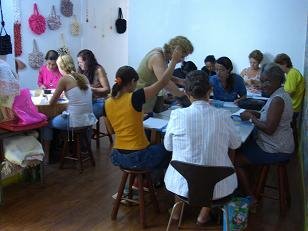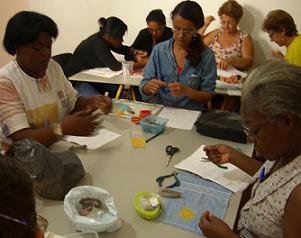The Numbers Are In
 Great news! Along with the regular day-to-day runnings of the Casa -- like the current workshop for jewelry-making going on Wednesday mornings run by and for women leaders -- we've been analyzing accumulated data about the Casa's reach over these past 3 years. You may have received CatComm's latest Newsletter (No. 10), which includes, among other things, a summary of numbers as we knew them in early May. We are happy to announce the new figures show we've understated the Casa's geographic reach significantly!
Great news! Along with the regular day-to-day runnings of the Casa -- like the current workshop for jewelry-making going on Wednesday mornings run by and for women leaders -- we've been analyzing accumulated data about the Casa's reach over these past 3 years. You may have received CatComm's latest Newsletter (No. 10), which includes, among other things, a summary of numbers as we knew them in early May. We are happy to announce the new figures show we've understated the Casa's geographic reach significantly!Previous figures showed leaders from some 72 communities in Rio, 7 other municipalities across the state, 5 Brazilian states, and 17 nations have benefitted from the Casa over the past 3+ years. Today we can confirm the numbers to be: visitors from 159 communities in Rio (keep in mind there are 750 favelas, or squatter communities), 7 other municipalities across the state, 19 Brazilian states, and 19 nations!
 The gender breakdown has remained the same, with some 52% of Casa visitors being women like those from Woman in Action, the coalition of women leaders from a variety of favelas taking part in this jewerly-making workshop (these photos were taken on Wednesday, May 31st). They then take this expertise back to their communities where they teach other women in need of income-generating activities.
The gender breakdown has remained the same, with some 52% of Casa visitors being women like those from Woman in Action, the coalition of women leaders from a variety of favelas taking part in this jewerly-making workshop (these photos were taken on Wednesday, May 31st). They then take this expertise back to their communities where they teach other women in need of income-generating activities.Like these women, over 950 other community leaders from 159 different communities in Rio have depended on the Casa for a host of activities to strengthen their community projects, whether peer workshops like this, or workshops offerred by visitors (from journalists to foreign fundraisers), or use of the technology center to prepare community projects for funding, outreach materials, and more.
Just last week (May 22-26) four stories emerged. A representative of The Green Life contacted us about developing a network of environmental NGOs in Brazil and beyond... Two homeless community advocates starting an institute to share information about the homeless visited the Casa to thank CatComm for the resources and tools we share, explaining that it was at the Casa that they found the inspiration and tools to start this effort... A community leader that runs the "Samba Republic" project posted in the Community Solutions Database invited members of a group of black Muslims he met at the Casa to talk at an event he is organizing in one of the city's communities. And finally, another leader, using the computer facilities at the Casa, is developing a network of Afro-Brazilian religions across Brazil.


<< Home